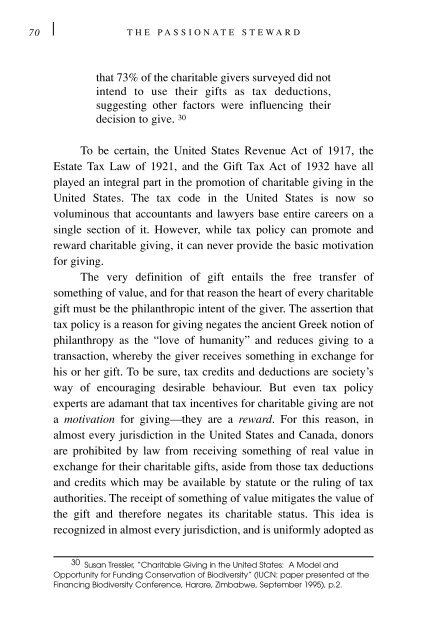Passionate Steward - 10th Anniversary Edition
10th Anniversary Edition of The Passionate Steward - Recovering Christian Stewardship from Secular Fundraising (St. Brigid Press - 2002).
10th Anniversary Edition of The Passionate Steward - Recovering Christian Stewardship from Secular Fundraising (St. Brigid Press - 2002).
You also want an ePaper? Increase the reach of your titles
YUMPU automatically turns print PDFs into web optimized ePapers that Google loves.
70 THE PASSIONATE STEWARD<br />
that 73% of the charitable givers surveyed did not<br />
intend to use their gifts as tax deductions,<br />
suggesting other factors were influencing their<br />
decision to give. 30<br />
To be certain, the United States Revenue Act of 1917, the<br />
Estate Tax Law of 1921, and the Gift Tax Act of 1932 have all<br />
played an integral part in the promotion of charitable giving in the<br />
United States. The tax code in the United States is now so<br />
voluminous that accountants and lawyers base entire careers on a<br />
single section of it. However, while tax policy can promote and<br />
reward charitable giving, it can never provide the basic motivation<br />
for giving.<br />
The very definition of gift entails the free transfer of<br />
something of value, and for that reason the heart of every charitable<br />
gift must be the philanthropic intent of the giver. The assertion that<br />
tax policy is a reason for giving negates the ancient Greek notion of<br />
philanthropy as the “love of humanity” and reduces giving to a<br />
transaction, whereby the giver receives something in exchange for<br />
his or her gift. To be sure, tax credits and deductions are society’s<br />
way of encouraging desirable behaviour. But even tax policy<br />
experts are adamant that tax incentives for charitable giving are not<br />
a motivation for giving—they are a reward. For this reason, in<br />
almost every jurisdiction in the United States and Canada, donors<br />
are prohibited by law from receiving something of real value in<br />
exchange for their charitable gifts, aside from those tax deductions<br />
and credits which may be available by statute or the ruling of tax<br />
authorities. The receipt of something of value mitigates the value of<br />
the gift and therefore negates its charitable status. This idea is<br />
recognized in almost every jurisdiction, and is uniformly adopted as<br />
30 Susan Tressler, “Charitable Giving in the United States: A Model and<br />
Opportunity for Funding Conservation of Biodiversity” (IUCN: paper presented at the<br />
Financing Biodiversity Conference, Harare, Zimbabwe, September 1995), p.2.




